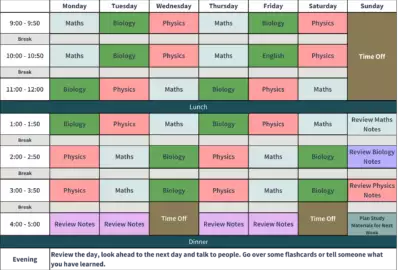Expert Insights
How to Revise Effectively: 13 Science-Backed Tips for Exam Success
Published 1st November 2024 by Alastair

Exams can be challenging, but by applying scientifically supported study methods, you can make your revision sessions more effective and less stressful.
The tips below are grounded in cognitive psychology research, meaning they’re not only effective but also backed by studies on how our brains best learn and retain information.
Whether you’re preparing for GCSEs, A-Levels, or university entrance exams, these techniques will help you build confidence and make the most of your revision time. We’ll also answer common questions, share practical tips, and guide you on getting the support you need.
Effective revision begins long before exams are on the horizon. Planning ahead gives you a huge advantage, allowing you to create a detailed timetable that includes each subject and topic area you need to cover. Starting early also lets you spread out revision (see Tip 3) rather than cramming everything at the last minute. Write down a clear plan, and divide larger topics into smaller, more manageable sections. Use a calendar or digital planner to allocate time for each subject.
While learning preferences may not be really be confined to categories like "kinaesthetic" or "visual" 'learning styles', discovering individualised learning approaches is still important.
Whether you learn better through discussion, such as teaching others, auditory instruction, visual aids such as mind-maps or flash cards for memorisation, or writing notes, identifying and consistently using the most effective methods will help you with your motivation and results.
In truth, it is probably best to employ various learning strategies rather than rely solely on one approach. Incorporating holistic methods such as the Pomodoro Technique (see tip 5) can also enhance your learning experience.
Instead of studying everything in one session, spread your revision over multiple days or weeks and avoid cramming. Known as Distributed Practice or the Spacing Effect, this approach is proven to improve long-term memory retention. For example, study a topic one day, review it briefly a few days later, and revisit it again the following week. Spacing sessions out allows your brain to process and retain information better than cramming.
Creating a structured, spaced revision plan can be challenging, especially with a full syllabus to cover. If you’re feeling overwhelmed or unsure how to design an effective study plan, consider working with a tutor who can provide expert guidance.
A tutor can help you:
Discover Ivy Education’s expert tutoring services and take the guesswork out of planning your revision. Our experienced tutors work with you to ensure you’re studying effectively and retaining information for long-term success.
Actively testing yourself is a highly effective study strategy. This technique, called Retrieval Practice, works better than simply reviewing notes, as it forces your brain to recall information. Use flashcards, quiz apps, or write down everything you remember about a topic and then check for accuracy. Testing strengthens memory connections and makes it easier to retrieve information during the actual exam.

Regular breaks prevent burnout and keep you focused. Try the Pomodoro Technique: study for 25 minutes, then take a 5-minute break. After four cycles, take a longer break. This method maintains productivity and reduces fatigue.
This video can help you learn how to use the Pomodoro Technique effectively.
Familiarise yourself with the exam format by practicing past papers. This is particularly effective in identifying areas of strength and topics that need more attention. Regular practice under exam conditions can improve time management and reduce exam anxiety.
No matter what stage you're at, if you're taking your 11+ exams, GCSE, A Levels, or Uni exams, this is may be one of the most effective ways of revising. Not only are you familiarising yourself with the types of topics that you may encounter in your exam, but you are also revising by utilising a combination of the previous techniques, such as retrieval practice.
Teaching or explaining what you’ve learned, called Self-Explanation or teaching others, reveals gaps in your understanding and reinforces knowledge Try explaining complex concepts to a friend or family member to ensure clarity.
Rather than focusing on a single topic for hours, try mixing up different subjects within a session. Known as Interleaved Practice, this approach has been shown to improve adaptability and problem-solving skills (source). For example, spend 30 minutes on maths, then switch to literature, and follow with a quick science review. This keeps your brain engaged and strengthens your ability to apply knowledge across different contexts.
Pairing words with visuals, a technique called Dual Coding, makes it easier to understand and retain information. Create mind maps, flowcharts, or annotated diagrams to organise complex topics. For example, if you’re studying biology, a mind map connecting cell structures to their functions can help you visualise and remember the relationships between concepts. If you're building out your revision timetable, then colour-code your subjects to help you associate specific colours with memory recall.
Engaging with material through questions like “why” helps you understand and remember complex concepts. Known as Elaborative Interrogation, this method encourages you to think critically. For example, if you're revising for GCSE history, ask why events happened as they did and how they connect to other events. This encourages deeper learning and comprehension.
Use past assessments or mock exams to identify areas needing improvement and prioritise these in your revision plan. Tackling weaknesses early in your study plan builds confidence and ensures more balanced preparation. Working on weak areas is especially helpful when preparing for multi-subject exams, where each mark counts.
Maintaining a healthy diet is crucial for optimal brain function and cognitive performance. Research indicates that certain nutrients can enhance memory, attention, and overall mental clarity. For instance, omega-3 fatty acids, found in fish like salmon and mackerel, are essential for brain health and have been linked to improved cognitive abilities. Additionally, antioxidants present in fruits and vegetables help protect brain cells from damage. Incorporating a balanced diet rich in these nutrients can significantly boost your study efficiency and exam performance.
Keeping a positive outlook can help reduce exam stress. Practice mindfulness or relaxation techniques, such as deep breathing or short meditation sessions, to stay calm and focused. Remember, exams are a stepping stone, not the final destination. Maintaining a positive mindset can improve your concentration and productivity.

Sometimes, self-study alone isn’t enough to tackle the full scope of exam preparation, especially when trying to cover multiple subjects or complex topics. That’s where the guidance of an expert tutor can make a world of difference. A tutor from Ivy Education can provide not only subject-specific insights but also help you build an effective, tailored study plan that incorporates the best revision strategies, like Distributed Practice and Active Recall.
With the support of an Ivy Education tutor, you gain:
Maximise your potential with a structured, professional approach to revision. Explore Ivy Education’s tutoring options today and take your exam preparation to the next level.
Spaced repetition involves spreading out study sessions over time, which enhances long-term retention by allowing the brain to consolidate information between sessions.
Scientific studies suggest there is no one preferred learning style. Instead, reflect on past learning experiences to identify whether you prefer visual aids, listening to information, or hands-on activities, and use a combination of as many of these as possible to help you learn.
Active recall requires retrieving information from memory, strengthening neural connections and improving retention.
Regular practice, such as weekly sessions, can help familiarise you with exam formats and identify areas needing improvement.
Mindfulness meditation, deep-breathing exercises, and regular physical activity can help reduce stress and maintain focus.
Explaining concepts to others requires a deep understanding, reinforcing your knowledge and revealing any gaps.
The Pomodoro Technique involves working in focused intervals (e.g., 25 minutes) followed by short breaks, enhancing concentration and productivity.
Mind maps visually organize information, showing relationships between concepts, which aids in comprehension and recall.
Adequate sleep, nutrition, and exercise support cognitive function, energy levels, and overall well-being, facilitating effective studying.
Setting clear goals, rewarding yourself for progress, and maintaining a positive mindset can help sustain motivation during revision.
















